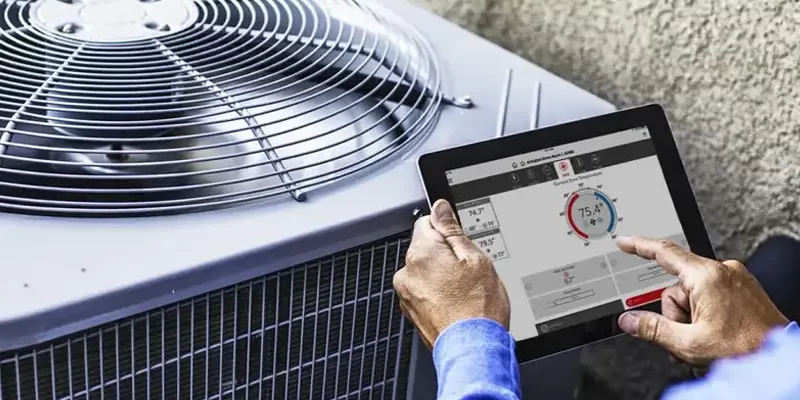In today’s rapidly evolving technological landscape, harnessing AI insights for HVAC asset management is not just a trend; it’s a necessity. The integration of artificial intelligence into HVAC systems is revolutionizing how we manage and maintain these crucial assets. By leveraging AI, businesses can significantly improve efficiency, reduce costs, and extend the lifespan of their HVAC equipment.

Understanding the Role of AI in HVAC Systems
AI technology is transforming the way HVAC systems operate. Through advanced data analytics and machine learning algorithms, AI can analyze vast amounts of data to provide valuable insights into system performance, energy usage, and potential faults. This proactive approach helps in identifying issues before they become major problems, thus saving time and resources.
Benefits of Implementing AI in HVAC Management
One of the primary benefits of using AI in HVAC asset management is the ability to achieve predictive maintenance. This means that potential issues can be detected and addressed before they lead to system failures. Additionally, AI can optimize energy consumption, ensuring that HVAC systems operate at peak efficiency while minimizing costs.
How AI Enhances HVAC Energy Efficiency
Energy efficiency is a critical concern for businesses and homeowners alike. By analyzing HVAC energy usage patterns, AI can provide recommendations for optimizing energy consumption. This not only reduces utility bills but also contributes to a greener environment.
Real-time Monitoring and Alerts
AI-powered systems enable real-time monitoring of HVAC equipment. This feature allows facility managers to receive real-time anomaly alerts, enabling swift action to rectify any issues. Such a proactive approach ensures minimal downtime and enhances system reliability.
Cost Savings Through Predictive Maintenance
Predictive maintenance is a game-changer for HVAC asset management. By utilizing AI, businesses can predict when a component is likely to fail and schedule maintenance accordingly. This approach not only reduces unexpected breakdowns but also minimizes repair costs and extends the life of the equipment.
Automated Refrigerant Level Detection
Maintaining the correct refrigerant levels is crucial for optimal HVAC performance. AI can automate the detection of refrigerant levels, ensuring that they are always within the optimal range. This automation helps in preventing issues related to incorrect refrigerant levels, which can lead to increased energy consumption and system inefficiencies. Learn more about automated refrigerant detection.
Improving HVAC Technician Efficiency
AI tools are revolutionizing the way HVAC technicians work. By providing smart tools and insights, AI empowers technicians to diagnose issues faster and with greater accuracy. This not only improves the efficiency of service calls but also enhances customer satisfaction.
AI-Powered Reports for Inspections
Regular inspections are vital for maintaining HVAC systems. AI can generate detailed reports that provide insights into the condition of the equipment. These AI-powered reports help facility managers make informed decisions regarding maintenance and upgrades.
Challenges in Implementing AI in HVAC Systems
While AI offers numerous benefits, there are challenges associated with its implementation. These include the initial cost of AI systems, the need for skilled personnel to manage AI tools, and potential data privacy concerns. However, the long-term benefits of AI in terms of efficiency and cost savings far outweigh these challenges.
Overcoming Barriers to AI Adoption
To successfully integrate AI into HVAC systems, organizations must invest in training and development. By equipping their teams with the necessary skills and knowledge, businesses can overcome the barriers to AI adoption and fully realize its potential.
The Future of AI in HVAC Asset Management
The future of AI in HVAC asset management looks promising. As AI technology continues to evolve, we can expect even more sophisticated tools and solutions that will further enhance the efficiency and reliability of HVAC systems. Businesses that embrace these advancements will be well-positioned to achieve significant competitive advantages.
Embracing Innovation for Sustainable Growth
Incorporating AI into HVAC asset management is a step towards sustainable growth. By embracing innovation and leveraging the power of AI, businesses can reduce their environmental impact, optimize resource usage, and achieve long-term success.
Conclusion
In conclusion, the integration of AI insights for HVAC asset management is transforming the industry. By enabling predictive maintenance, optimizing energy efficiency, and enhancing technician capabilities, AI is revolutionizing the way HVAC systems are managed. As technology continues to advance, businesses that adopt AI will enjoy significant benefits in terms of efficiency, cost savings, and sustainability.

FAQ Section
What are the benefits of using AI in HVAC systems?
AI enhances HVAC systems by enabling predictive maintenance, optimizing energy efficiency, and improving system reliability, leading to cost savings and extended equipment lifespan.
How does AI contribute to energy efficiency in HVAC systems?
AI analyzes energy usage patterns and provides recommendations for optimizing consumption, resulting in reduced utility bills and a smaller environmental footprint.
What challenges are associated with implementing AI in HVAC management?
Challenges include the initial cost of AI systems, the need for skilled personnel, and potential data privacy concerns. However, these are outweighed by the long-term benefits of efficiency and cost savings.
This article contains affiliate links. We may earn a commission at no extra cost to you.
